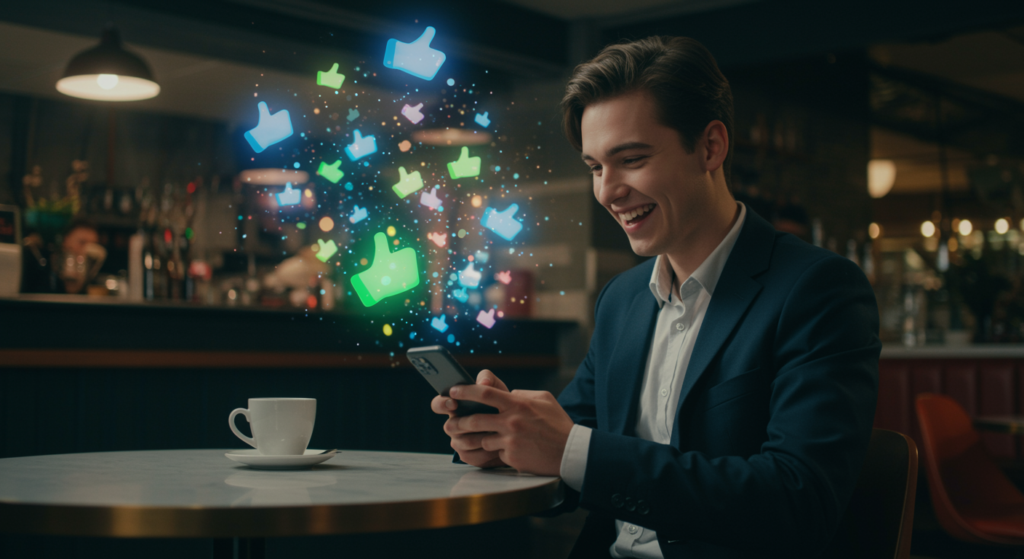
How AI Uses Likes to Influence Minds
The Digital Age of Influence: A New Paradigm
Imagine scrolling through your social media feed, where every like feels like a small victory. In today’s connected world, AI influence plays a pivotal role in what catches your eye and how it affects your thoughts. Social platforms have evolved into powerful tools that use these simple interactions to craft personalized experiences, subtly guiding our preferences and decisions without us always noticing.
Have you ever wondered why certain posts dominate your timeline? It’s not by chance—AI influence through likes creates a tailored ecosystem that keeps us hooked. By analyzing vast amounts of data from user engagements, these algorithms decide what’s relevant, turning casual likes into tools for behavioral shaping.
AI Influence: The Science Behind Likes as a Data Goldmine
Likes might seem trivial, but they’re a treasure trove for AI influence. Every time you hit that thumbs-up button, you’re feeding advanced algorithms with real-time data that helps them understand your interests deeply. These systems don’t just collect information; they use it to predict future behaviors, making your feed feel uncannily personal.
For instance, think about how a simple like on a recipe video could lead to a flood of cooking content. AI algorithms process patterns like the timing of your interactions and the types of posts you favor, building profiles that influence what you see next. This creates a feedback loop where engagement drives more engagement, amplifying AI’s influence on your daily habits.
Key Data Points AI Analyzes for Influence:
- The frequency and exact timing of your likes, revealing when you’re most active
- The genres of content you interact with, from memes to news articles
- Your connections within online communities, helping AI map social networks
- Sentiment derived from comments alongside likes, painting a fuller picture of your emotions
This data-driven approach isn’t just efficient—it’s how AI influence turns passive scrolling into active mind-shaping. According to research, platforms leverage this to keep users coming back, often prioritizing content that sparks quick reactions.
Personalization and the Psychological Effects of AI Influence
Personalized feeds powered by AI influence make social media addictive, but they also come with unseen costs. By curating content based on your likes, these algorithms enhance your experience while potentially altering your self-perception. It’s like having a digital mirror that reflects back what you want to see, but sometimes at the expense of broader perspectives.
Ever felt a rush from a like on your post? That validation can be empowering, yet it often leads to behaviors like constant self-comparison. Studies show that this cycle can heighten anxiety or foster FOMO, where AI influence inadvertently traps users in echo chambers. To counter this, consider how diversifying your interactions might break the pattern and promote a healthier online presence.
Psychological Effects Stemming from AI’s Influence Through Likes:
- A surge in seeking validation, often tied to how many likes you receive
- Growing feelings of anxiety and the fear of missing out on trends
- Diminished self-esteem from comparing your life to curated feeds
- The creation of filter bubbles that limit exposure to diverse viewpoints
What if we used this knowledge to our advantage? By being mindful of how AI influence works, you can actively shape a more balanced digital life.
How Social Media Platforms Harness AI Influence with Likes
Major players like Facebook, Instagram, and TikTok have mastered using likes to exert AI influence, turning them into engines for user retention and trend creation. These platforms don’t just display content; they algorithmically promote what’s likely to engage you most, influencing everything from viral challenges to influencer rise.
Take TikTok, for example—its AI quickly learns from your likes to flood your feed with similar videos, keeping you entertained for hours. This isn’t accidental; it’s a strategic move to boost ad revenue and user loyalty. By examining how these systems operate, we see AI influence at work in real-time, shaping cultural shifts and personal choices alike.
Examples of Platforms and Their AI Influence Tactics:
- Meta (Facebook and Instagram): Relies on AI to suggest connections and ads based on like patterns, making your experience feel tailor-made.
- TikTok: Uses sophisticated AI to push addictive content, learning from every like to refine recommendations instantly.
- Snapchat: Blends AI with AR to suggest dynamic stories, ensuring likes drive more personalized and interactive features.
These examples highlight how AI influence isn’t just about algorithms—it’s about creating ecosystems that feel intuitive yet profoundly impactful.
The Mechanisms of AI Influence: Turning Likes into Lasting Impact
At its core, AI influence transforms likes from mere metrics into powerful levers for change. When a post gains traction through likes, algorithms amplify its reach, creating a ripple effect that can sway public opinion or spark movements. It’s like a digital snowball: one like leads to more visibility, which generates even more interactions.
Consider a hypothetical scenario where a user’s like on an environmental post triggers AI to recommend similar content to their network. This loop not only reinforces the user’s beliefs but also spreads the message wider, demonstrating how AI influence can drive real-world actions. By understanding this process, you can appreciate the double-edged sword of engagement.
How the AI Influence Loop Operates Through Likes:
- A user engages with a post by liking it
- The AI algorithm logs this and analyzes it against other data
- Related content gets pushed to the user and their connections
- Increased engagement sustains the cycle, broadening the influence
This mechanism shows why AI influence is so pervasive, often leading to unintended consequences like misinformation spread.
From Likes to Potential Manipulation: The Darker Aspects of AI Influence
While AI influence offers convenience, it also opens doors to manipulation. Bad actors can exploit likes to push propaganda or targeted ads, making users vulnerable to subtle mind control. In a world where algorithms prioritize engagement, distinguishing fact from fiction becomes a critical skill.
Picture a scenario where a politically charged post gets likes from a few key users, prompting AI to promote it widely. This could amplify divisive content, eroding trust in information sources. As AI influence grows, so do the risks, including privacy breaches and psychological harm.
Potential Risks Associated with AI Influence:
- The rapid spread of fake news through highly liked viral posts
- Targeted campaigns that use likes for micro-targeting in politics or sales
- Amplification of extremist views, creating polarized online spaces
- A decline in authentic interactions, as algorithms favor sensational content
Ethical Considerations in the Era of AI Influence
Navigating AI influence requires addressing ethical dilemmas head-on. Platforms must balance user engagement with responsibilities like protecting mental health and ensuring data privacy. As technology advances, questions about transparency and user consent become more urgent.
What’s the best way forward? Experts suggest improving algorithm openness and giving users more control over their feeds. This could include features that limit AI influence on sensitive topics, fostering a safer digital environment.
Key Areas to Enhance Ethical AI Influence:
- Greater transparency about how algorithms process likes and data
- Robust privacy measures to safeguard user information
- Empowering tools for customizing personalization settings
- Partnerships between tech firms, governments, and experts to set guidelines
Empowering Users Against AI Influence
In the face of AI influence, you hold the power to reclaim control. Start by educating yourself on how likes shape your online world and take proactive steps to mitigate risks. For example, regularly auditing your feed and engaging with varied content can help break free from algorithmic biases.
Here are some practical tips: Set daily limits on social media use, verify sources before liking or sharing, and seek out diverse opinions to broaden your horizons. By doing so, you not only protect your mental well-being but also contribute to a more balanced digital community.
Conclusion: Mastering the Landscape of AI Influence
As we’ve explored, AI influence through likes has redefined how we interact online, offering personalization while posing challenges to our autonomy. The key is to stay informed and engaged, using this knowledge to foster positive changes. What steps will you take today to navigate this digital terrain more mindfully?
If this article resonated with you, I’d love to hear your thoughts in the comments below. Share this with friends who might benefit, or check out our other posts on digital trends for more insights. Let’s build a smarter online world together.
Frequently Asked Questions
- How does AI determine content based on likes?
AI algorithms use your like history and interactions to curate feeds, ensuring AI influence delivers content that matches your preferences for better engagement. - Can I reduce AI’s influence on my feed?
Absolutely—adjust your platform settings to limit data sharing and follow a mix of accounts to dilute AI influence effects. - What risks come with AI influence?
Key risks include exposure to misinformation and mental health impacts, as highlighted in recent studies on social media dynamics. - Is AI influence always harmful?
Not necessarily; when used responsibly, it can enhance connections and provide valuable recommendations, as long as users remain vigilant.
References
- The Center for Counseling. “How AI Is Changing the Social Media Landscape and Its Impact on Self-Esteem.” Link
- Feedhive. “The Impact of AI on Social Media Content Creation: Balancing Automation and Authenticity.” Link
- RAND Corporation. “Social Media Manipulation in the Era of AI.” Link
- Sprinklr. “AI in Social Media.” Link
- Hive Digital. “Influence of AI on Social Media.” Link
- Ry Rob. “AI Article Writer.” Link
- Infinity Marketing. “AI and Social Media Marketing.” Link
- Bruce Clay Inc. “What Is SEO Article?” Link
AI influence, social media algorithms, likes, digital psychology, user engagement, AI algorithms, social media influence, likes and AI, psychological effects, user behavior





